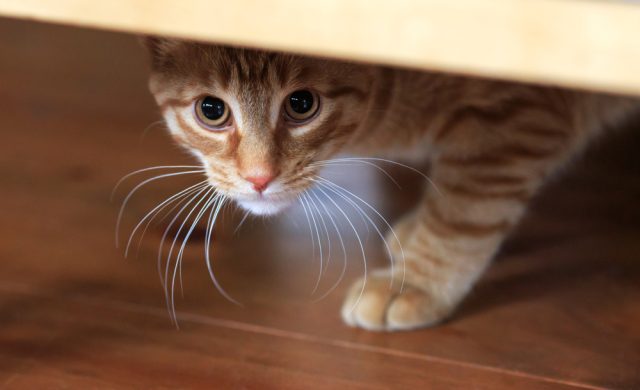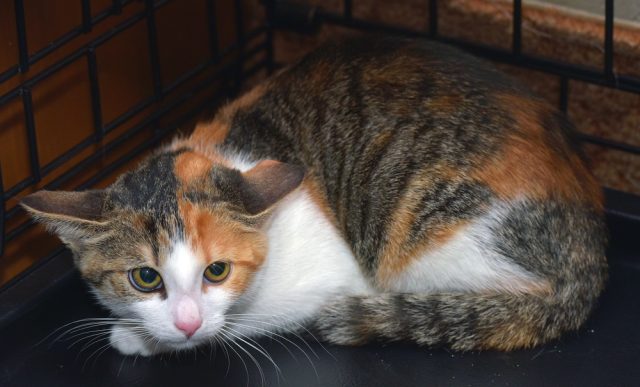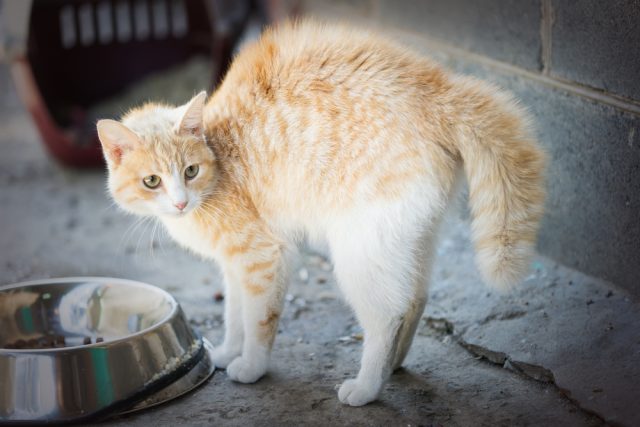Cats like to think that they’re always ferocious lions, but they get scared sometimes, just like the rest of us. Some cats, of course, are more easily scared than others. If you have a cat who spends a lot of time hiding or runs for cover under specific circumstances (a particular friend comes over, your neighbor is mowing the lawn, there’s a knock at your front door, etc.) you may wonder why. Here are 6 reasons your cat may be skittish.

#1 – A bit feral
Kittens who aren’t socialized while they’re young never learn to trust humans, even as adult cats. A cat who was properly socialized as a kitten can still be “semi-feral”. A semi-feral cat learned to trust humans as a kitten, but has since lived through a long stretch of time without human interaction. During that time, a formerly socialized cat can slip into having feral-like behaviors such as being skittish, scared, or aggressive. The good news is that semi-feral cats can be socialized again with effort, love, and patience.
#2 – Overstimulating home
Your cat may be overstimulated if you have a home that’s generally bustling or loud. Sensitive cats can be easily scared by unpredictable loud noises like toddlers screaming or cars honking their horns on the street outside. Since your cat’s sense of hearing is so strong, she may even be scared or overstimulated by sounds you don’t hear or notice, like a neighbor walking upstairs or road construction happening up the street.

#3 – Territorial dispute
Cats are territorial by nature. If you have a multi-cat home, you can bet there is some underlying territorial tension, even if you can’t see it. Many of the ways cats communicate with each other are so subtle that they’d take a real keen eye to notice. Your cat may be experiencing territorial issues even if she’s the only cat in your home. Is there a stray who has been hanging around outside a window? Your cat may perceive them as a real threat to her safety and livelihood.
#4 – Triggered by a trait
Cats who have been mistreated or abused in the past may be scared by certain physical traits related to their abuser. It can be hard to pinpoint the exact trigger without evaluating a large amount of interactions, but if you pay attention you may discover that your cat becomes uncharacteristically scared when interacting with a person with a specific trait such as having a beard, being tall, or having a certain voice pitch.

#5 – Pre-disposed to anxiety
Just like humans, some cats are simply born with more sensitive personalities and are more prone to being scared and anxious.
#6 – Underlying medical issue
A change in your cat’s behavior could indicate that there’s an underlying medical issue that needs to be addressed. If your cat is normally brave but has recently become more skittish, make an appointment with your veterinarian to see if there’s a medical link.
Some cats get over their fears once they settle into a new situation or become desensitized to a certain frightful stimulus. Others remain cautious and shy all their lives. The best things you can do to help your scaredy cat are to rule out a medical cause, identify and eliminate any stressors, and most importantly, give your kitty lots of love and support!
